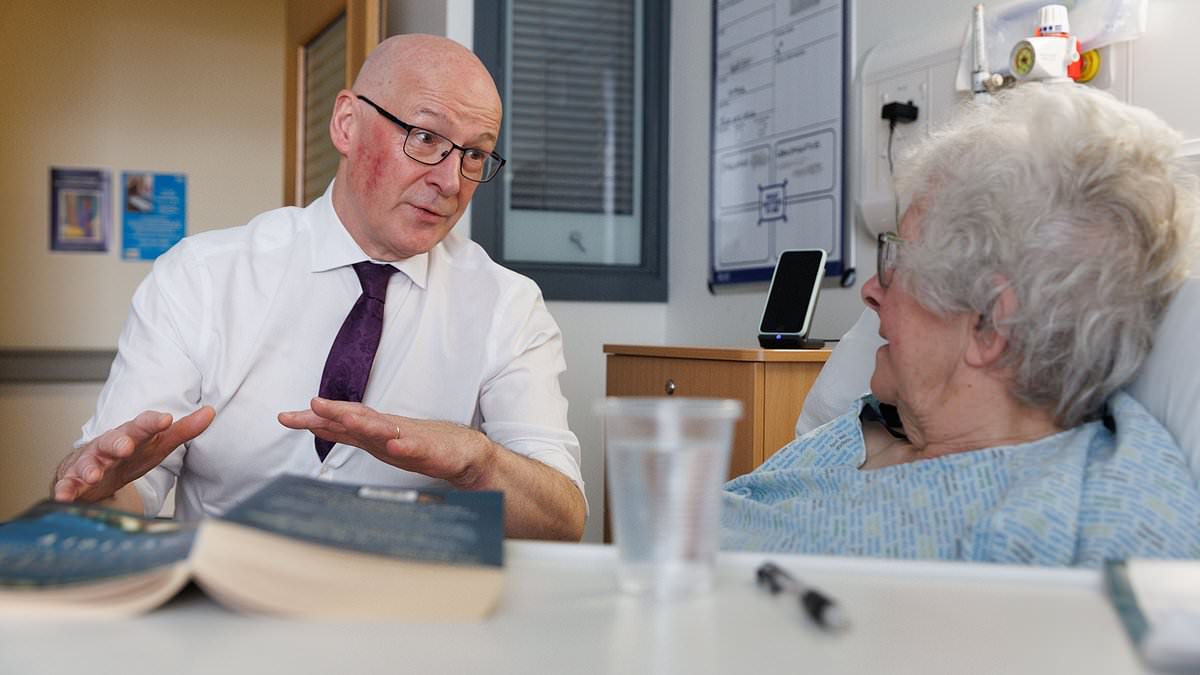Copyright dailymail

The latest desperate attempt to solve Scotland’s NHS crisis is ‘destined to fail’ unless the staffing crisis is addressed, nursing leaders have warned John Swinney. The First Minister yesterday unveiled details of an extra £25.5million cash injection for health boards to reduce waiting times across a range of specialisms for both outpatient and inpatient appointments. But the Royal College of Nursing (RCN) warned that the move will fail to make a difference unless it is accompanied by substantial investment to tackle the staffing crisis in hospitals. Surgeons also pleaded with ministers to deliver further national treatment centres to tackle huge backlogs, while opponents dismissed the investment as a ‘drop in the ocean’ which will ‘barely touch the sides’. It comes as figures last week showed an improvement in the number of patients waiting more than a year for appointments but another increase in median waits for outpatients and a jump in the number of patients facing the longest waits of more than two or three years. Mr Swinney yesterday said the new investment would deliver more appointments and procedures for patients. Colin Poolman, executive director of RCN Scotland, said: ‘Plans to create additional capacity are to be welcomed but these must be matched by investment in staffing and not rely on the goodwill of nursing staff working additional hours. ‘If the underlaying issues of insufficient staffing and lack of capacity, particularly within community health and social care services are not addressed, initiatives to address waiting times will be destined to fail.’ When he unveiled the extra funding on a visit to the Queen Elizabeth University Hospital in Glasgow yesterday, Mr Swinney said the total number of people waiting and the longest waits are both coming down. But last week’s official data showed the number of people waiting more than two years for a new outpatient appointment soared by a further two per cent in the most recent month, from 6,488 at the end of August to 6,663 at the end of September – and is an astonishing 78.6 per cent higher than the same time last year. There was also a 42 per cent increase in the number of people having to wait more than three years, from 436 at the end of August to a record high of 619 at the end of September. There was a 4,425 reduction in the total number of people waiting more than a year, which stood at 56,439 at the end of September, but ministers had previously planned to eradicate these longer waits completely. Scottish Conservative health spokesman Dr Sandesh Gulhane said: ‘This funding is a drop in the ocean when our health service is in permanent crisis mode after years of SNP mismanagement. ‘John Swinney is all talk and no action when it comes to our NHS. Frontline staff are at breaking point and thousands of Scots are waiting over two tears for treatment – despite nationalist ministers promising to eradicate waits of over a year by the end of last year. ‘These delays, all but eradicated in England under the last UK Conservative government, are taking a brutal toll on patients’ physical and mental health and on our economy. ‘This sum will barely touch the sides when it comes to tackling these lengthy delays. Instead of tinkering round the edges, John Swinney needs to back our plans to cut red tape, reduce the number of middle managers and surge resources to the frontline.’ Professor Rowan Parks, president of the Royal College of Surgeons, said waiting times are a ‘major issue for our population’, with one in nine waiting for assessment or treatment. He urged ministers to look at ‘redesign’ and ‘renewal’ of NHS services, as well as efforts to tackle cancelled appointments, and called for the network of national treatment centres to be expanded. The Scottish Government previously planned to build 10 national treatment centres but has only developed five. Professor Parks told BBC Good Morning Scotland: ‘There is various ways to tackle inpatient waiting times, day case waiting times, and one of the things we would really advocate for is increased use of national treatment centres. ‘We’ve got five in Scotland, there was a pause put on some further developments of those and we would love to see that because that is a way of planning in advance and particularly tackling high volume cases, lower complexity that can be more efficiently driven through structures such as using national treatment centres.’ He said existing systems in large hospitals are impacted by unscheduled care, which can take away available beds, whereas national treatment centres efficiently focus on planned care. Unveiling the £25.5 million injection of funding to nine health boards yesterday, Mr Swinney said it takes total additional investment in the NHS to reduce waiting times this year to £135.5 million. The extra funds will benefit specialities including orthopaedics, dermatology, general surgery and gynaecology, while cardiology and paediatrics will also get extra funding. Mr Swinney said: ‘The latest figures show our plan to support Scotland’s NHS is working, delivering real benefits for patients. We have already provided £110 million of additional targeted funding this year to tackle the longest waits. Now we are providing a further boost to deliver more appointments and procedures, taking the total additional funding to £135.5 million for 2025-26. ‘I am determined to build on the progress being achieved by hardworking staff in our health service, like those I met today at Queen Elizabeth University Hospital. We want to help them provide the care and treatment patients need and expect – and we are already seeing results. ‘Not only are the total list size and longest waits coming down, but we are treating more people than last year. There is still work to be done, but these are very welcome improvements. ‘Under my leadership, the people of Scotland can expect a strong National Health Service delivering patient care of the highest possible quality.’ Scottish Labour health spokesman Jackie Baillie said: ‘John Swinney and the SNP have an absolutely disgraceful track record when it comes to reducing waiting times. ‘It has been five years since the Scottish Government met its own four-hour target on A&E waits, with thousands of Scots still having to endure agonising waits before being seen. ‘Instead of addressing the problem, SNP ministers have shamefully attempted to pull the wool over the eyes of Scots by fiddling the figures in a desperate bid to cover up for their failure to take action. ‘During his visit to the Queen Elizabeth University Hospital, John Swinney should have apologised to the patients and staff there for the appalling job that his government has done overseeing our health service, leaving patients seeking help and staff burned out.’



